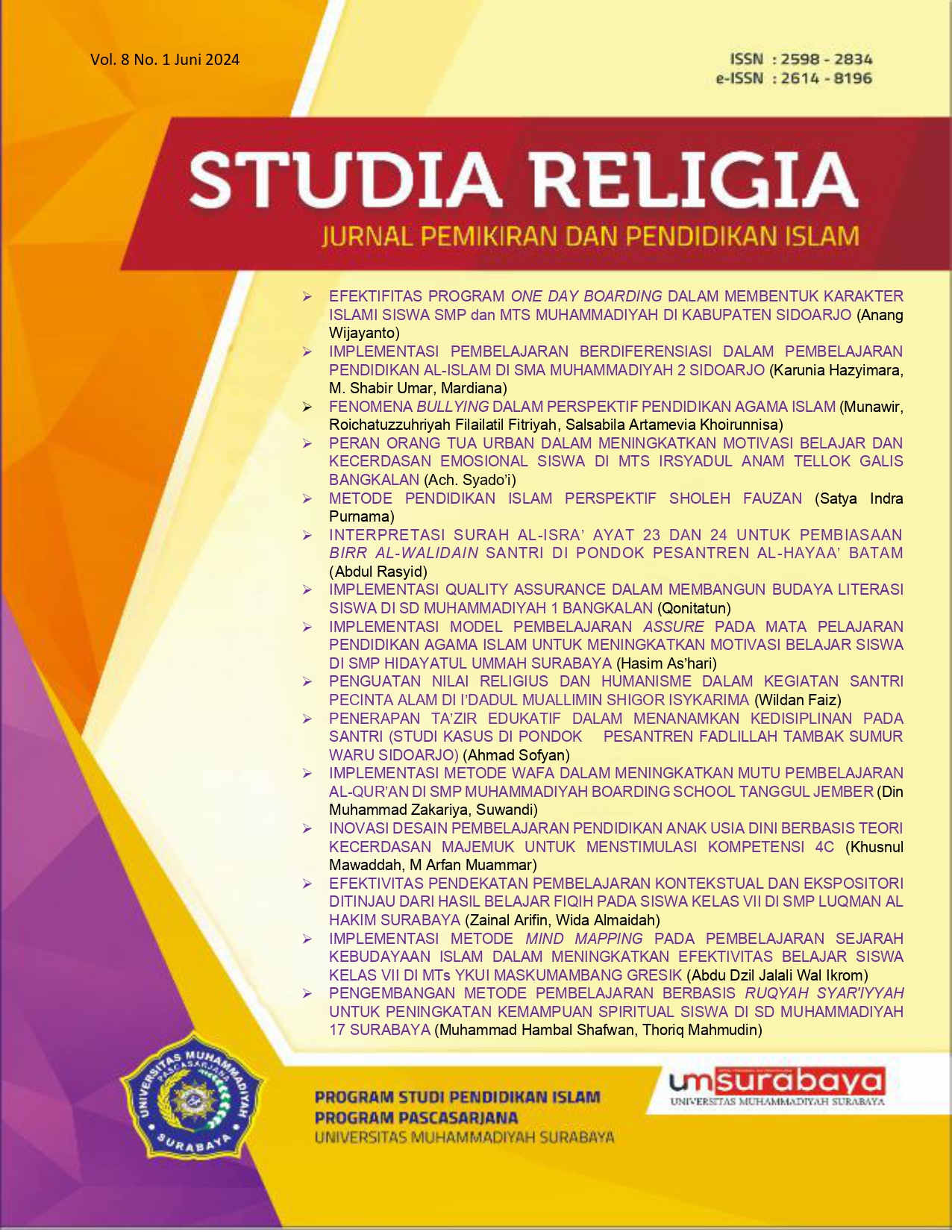IMPLEMENTASI METODE WAFA DALAM MENINGKATKAN MUTU PEMBELAJARAN AL-QUR’AN DI SMP MUHAMMADIYAH BOARDING SCHOOL TANGGUL JEMBER
DOI:
https://doi.org/10.30651/sr.v8i1.22492Abstract
The background of this research is related to the development of the various of Al-Qur'an learning methods, but the number of methods has not been comparable to the increasing quality of Al-Qur'an learning in educational institutions. Of the many methods of learning the Qur'an, one of them is based on a quality assurance system and has a real contribution to improving the quality of learning the Qur'an in formal education. This type of research is field research using qualitative research methods, data collection techniques are carried out through interviews, observations, and documentation, data obtained from primary and secondary sources. The results of the study on the quality of learning the Qur'an at SMP Muhammadiyah Boarding School Tanggul Jember included three stages. First, quality in the planning stage, Second, quality in the implementation stage, Third, quality in the evaluation stage. The implementation of the Wafa method in improving the quality of Al-Qur'an learning at SMP Muhammadiyah Boarding School Tanggul Jember is based on the standardization of Al-Qur'an learning the Wafa method through the 7M quality management system. Mapping, improving, standardizing, accompanying, supervising, munaqosyah and confirming.
References
Anggraena, Yogi, Nisa Felicia, Dion Eprijum, Indah Pratiwi, Bakti Utama, Leli Alhapip, and Dewi Widiaswati. Kurikulum Untuk Pemulihan Pembelajaran. Jakarta: Pusat Kurikulum dan Pembelajaran Kementerian Pendidikan, Kebudayaan, Riset, dan Teknologi, 2022.
Indra, Hasbi. “Taman Pendidikan Al-Qur’an Berbasis Pendidikan Manusia.” Risâlah, Jurnal Pendidikan dan Studi Islam 6, no. 1 (2020): 150–164.
Kusuma, Yuanda. “Model-Model Perkembangan Pembelajaran Btq Di Tpq/Tpa Di Indonesia.” J-PAI: Jurnal Pendidikan Agama Islam 5, no. 1 (2018): 46–58.
Moeleong, Lexy. Metodologi Penelitian Kualitatif. Bandung: Remaja Rosdakarya, 2002.
Nurul Hidayati. “Teori Pembelajaran Al Qur’an.” Al Furqan: Jurnal Ilmu Al Quran dan Tafsir 4 (2021): 24–33. http://ejournal.iai-tabah.ac.id/index.php/Alfurqon/article/view/635%0Ahttps://ejournal.iai-tabah.ac.id/index.php/Alfurqon/article/download/635/450.
Rusdiah. “Konsep Metode Pembelajaran Al Qur’an.” Jurnal Ilmiah Pendidikan Agama Islam 2, no. 1 (2012): 1–25.
Shafwan, Muhammad Hambal. “Analisis Model Pendidikan Tauhid Di Pesantren Al-Ikhlash Lamongan, Indonesia.” Tsaqafah 17, no. 1 (2021): 141–160. https://ejournal.unida.gontor.ac.id/index.php/tsaqafah/article/view/6662.
———. “Tahfidz Al-Qur’an Education in Elementary Age Children with the Taghanni Talaqqi Method at Mim 02 Sedayulawas Brondong Lamongan East Java Indonesia.” Education Journal 12, no. 4 (2023): 121–129. https://www.sciencepublishinggroup.com/article/10.11648.j.edu.20231204.12.
Sugiyono. Metode Penelitian Kuantitatif, Kualitatif, Dan R&D. Bandung: Alfabeta, 2010.
Tolchah, H. M. Dinamika Pendidikan Islam Pasca Orde Baru. Edited by Chafid Wahyudi. 1st ed. Yogyakarta: LKiS Pelangi Aksara, 2015.
Undang-Undang Republik Indonesia. “Sistem Pendidikan Nasional,” no. 20 (2003): 147–173.
Downloads
Published
Issue
Section
License
Copyright (c) 2024 Din Muhammad Zakariya, Suwandi Suwandi

This work is licensed under a Creative Commons Attribution-NonCommercial 4.0 International License.
Penulis tetap memegang hak atas karyanya dan memberikan hak publikasi pertama kepada jurnal ini yang secara simultan karya tersebut dilisensikan di bawah:
Creative Commons Attribution-NonCommercial 4.0 International License









